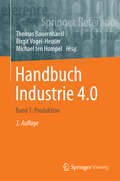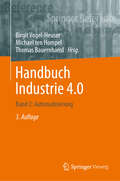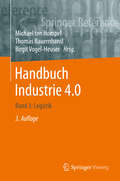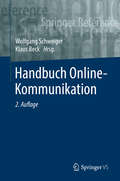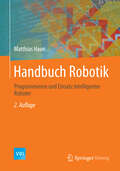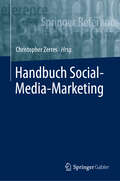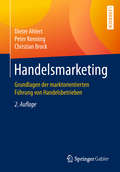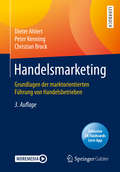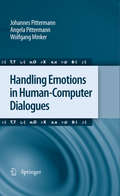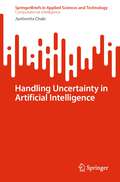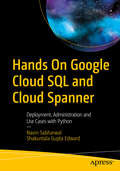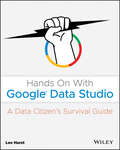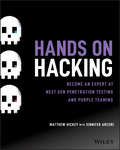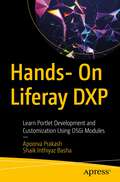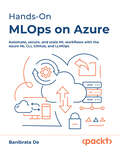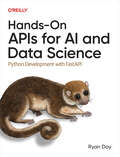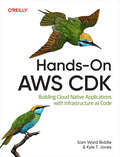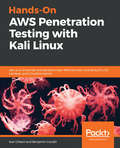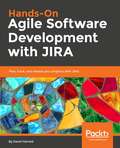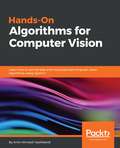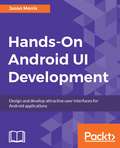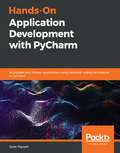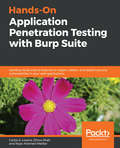- Table View
- List View
Handbuch Industrie 4.0: Band 1: Produktion (Springer Reference Technik Ser.)
by Thomas BauernhanslMit der Neuauflage des erfolgreichen Werkes wird die Geschichte der vierten industriellen Revolution fortgeschrieben und der Dynamik Rechnung getragen, mit der die Vision in den vergangenen zwei bis drei Jahren weiterentwickelt und verwirklicht wurde.Experten aus Wissenschaft und Technik beleuchten verschiedene Facetten der Industrie 4.0 und schaffen gleichermaßen einen Überblick über den Stand der Technik und die Vision selbst. Dies gelingt nicht zuletzt Dank einer ausgewogenen Mischung aus wissenschaftlichen Erkenntnissen, Praxisbeispielen und Übersichtsbeiträgen. Die Themen der Beiträge reichen von Basistechnologien über Integrations- und Migrationsansätze bis hin zu Geschäftsmodellen und Dienstleistungen für die Industrie 4.0. Zudem werden die Datensicherheit und auch rechtliche Aspekte mit Datenanalyse und maschinellem Lernen behandelt. In der dritten Auflage werden die Themenfelder um Künstliche Intelligenz, aktuelle Mobilfunkstandards und den daraus resultierenden Potentialen für eine zukünftige Plattformökonomie erweitert.Die dritte überarbeitete und erweiterte Auflage erscheint wiederum in 3 Bänden. Der vorliegende erste Band wurde von Thomas Bauernhansl und Andreas Bildstein konzeptioniert und umfasst neue und bearbeitete Beiträge zur Produktion. Online ist dieses Nachschlagewerk auch über Springer Reference verfügbar.
Handbuch Industrie 4.0: Band 2: Automatisierung
by Michael Ten Hompel Birgit Vogel-Heuser Thomas BauernhanslMit der Neuauflage des erfolgreichen Werkes wird die Geschichte der vierten industriellen Revolution fortgeschrieben und der Dynamik Rechnung getragen, mit der die Vision in den vergangenen zwei bis drei Jahren weiterentwickelt und verwirklicht wurde.Experten aus Wissenschaft und Technik beleuchten verschiedene Facetten der Industrie 4.0 sowohl aus akademischer als auch aus praktischer Sicht und schaffen gleichermaßen einen Überblick über den Stand der Technik und die Vision selbst. Dies gelingt nicht zuletzt dank einer ausgewogenen Mischung aus wissenschaftlichen Erkenntnissen, Praxisbeispielen und Übersichtsbeiträgen. Die Themen der Beiträge reichen von Basistechnologien (bspw. cyber-physische Systeme) über Integrations- und Migrationsansätze bis hin zu Geschäftsmodellen und Dienstleitungen für die Industrie 4.0. Zudem werden die Datensicherheit und auch rechtliche Aspekte behandelt. In der 3. Auflage werden die Themenfelder um Künstliche Intelligenz, aktuelle Mobilfunkstandards und den daraus resultierenden Potentialen für eine zukünftige Plattformökonomie erweitert. Die dritte Auflage wurde bearbeitet und erweitert, erscheint nun in 3 Bänden. Dieser zweite Band beinhaltet neue und bearbeitet Beiträge zur Automatisierung. Online ist dieses Nachschlagewerk auch über Springer Reference verfügbar.
Handbuch Industrie 4.0: Band 3: Logistik (Springer Reference Technik Ser.)
by Michael Ten Hompel Birgit Vogel-Heuser Thomas BauernhanslMit der Neuauflage des erfolgreichen Werkes wird die Geschichte der vierten industriellen Revolution fortgeschrieben und der Dynamik Rechnung getragen, mit der die Vision in den vergangenen zwei bis drei Jahren weiterentwickelt und verwirklicht wurde.Experten aus Wissenschaft und Technik beleuchten verschiedene Facetten der Industrie 4.0 und schaffen gleichermaßen einen Überblick über den Stand der Technik und die Vision selbst. Dies gelingt nicht zuletzt Dank einer ausgewogenen Mischung aus wissenschaftlichen Erkenntnissen, Praxisbeispielen und Übersichtsbeiträgen. Die Themen der Beiträge reichen von Basistechnologien über Integrations- und Migrationsansätze bis hin zu Geschäftsmodellen und Dienstleistungen für die Industrie 4.0. Zudem werden die Datensicherheit und auch rechtliche Aspekte mit Datenanalyse und maschinellem Lernen behandelt. In der dritten Auflage werden die Themenfelder um Künstliche Intelligenz, aktuelle Mobilfunkstandards und den daraus resultierenden Potentialen für eine zukünftige Plattformökonomie erweitert.Die dritte überarbeitete und erweiterte Auflage erscheint wiederum in 3 Bänden. Der vorliegende dritte Band umfasst neue und bearbeitete Beiträge zur Logistik. Online ist dieses Nachschlagewerk auch über Springer Reference verfügbar.
Handbuch KI-Verordnung: FAQ zum EU AI Act
by Paul Voigt Nils HullenDieses Praxishandbuch bietet eine verständliche und praxisnahe Einführung in die Regulierung von Künstlicher Intelligenz in der EU. Im Q&A-Stil werden praxisrelevante Fragen zur KI-Verordnung aufgegriffen und lösungsorientiert beantwortet. Das Buch richtet sich explizit auch an Nicht-Juristen. Es bietet Hinweise auf bereits existierende Standards, Normen und Frameworks und erklärt deren Relevanz, um frühzeitig die Einhaltung der Anforderungen der KI-Verordnung zu ermöglichen. Die KI-VO regelt umfassend und sektorübergreifend die Anforderungen an KI-Systeme. Sie gilt für große Unternehmen ebenso wie für Startups, für NGOs und für Behörden. Dieses Handbuch orientiert sich in erster Linie an den Bedürfnissen von Unternehmen jeder Größe, die KI-Systeme entwickeln oder nutzen. Schon mit Inkrafttreten der KI-VO im Sommer 2024 stellen sich zahlreiche Fragen bei der Umsetzung ihrer Vorgaben. Ab wann und für welche Arten von KI gilt die KI-VO? Welche Pflichten treffen KI-Systeme und KI-Modelle? Für welche Risikoklassen gibt es besondere Compliance-Anforderungen? Welche Vorgaben müssen erfüllt sein, um KI-Systeme in der EU anbieten zu können? Welche Bußgelder drohen bei Verstößen? Auf diese und viele weitere Fragen bietet das Handbuch zur KI-Verordnung Antworten, um die Anforderungen der KI-Verordnung zu verstehen. Das kompakte Handbuch unterstützt Praktiker mit juristischem, technischem oder Compliance-Hintergrund dabei, KI-Lösungen schon heute rechtssicher umzusetzen.
Handbuch Online-Kommunikation
by Klaus Beck Wolfgang SchweigerDas Handbuch gibt in 23 Beiträgen einschlägiger FachautorInnen einen umfassenden und systematischen Überblick des aktuellen Forschungsstandes kommunikationswissenschaftlicher Online-Forschung. Einführend werden die zentralen Fragestellungen, theoretischen Ansätze und empirischen Befunde dargestellt. Das Themenspektrum reicht von den Grundlagen computervermittelter Kommunikation (interpersonale, Gruppen- und öffentliche Kommunikation), über ökonomische, ethische und politische Fragen wie Regulierung und Kontrolle des Internets, sowie seine Verbreitung, Nutzung und Wirkung. Weitere Beiträge befassen sich mit Öffentlichkeit und Journalismus online, kulturellen und sozialpsychologischen Aspekten, Online-Werbung und -PR, Gesundheitskommunikation, E-Learning und Wissensmanagement sowie Online-Spielen. Ein Überblick über Methoden der Online-Forschung sowie die wichtigsten Datenquellen und Standarduntersuchungen rundet das Werk ab.
Handbuch Robotik
by Matthias HaunZiele des Buches ist es, den Roboter als lernendes System aufzufassen, es als wissensbasiertes Modellsystem zu konzeptionalisieren und dieses System durch intelligente, rechnerbasierte Technologien in funktionaler Hinsicht zu implementieren. Das Ziel eines Ansatzes liegt in der Steigerung des systemischen Intelligenzquotienten (sIQ). Erreichbar wird dieses Ziel durch eine Modellierung auf Basis der Kognitionstheorie und der konkreten (Aus) implementierung dieser Modelle durch den Einsatz der Cognitive Computing Technologien unter der Programmiersprache Java.
Handbuch Social-Media-Marketing
by Christopher ZerresDieses Handbuch schafft einen umfassenden Überblick zu allen erfolgsentscheidenden Aspekten im Social-Media-Marketing. Social Media haben sich für viele Organisationen als wichtiger Marketingkanal etabliert. Branchenübergreifend entstehen in immer mehr Bereichen, wie etwa Werbung, Kundenservice oder Recruiting, gezielte Social-Media-Strategien. Ihre Entwicklung und ihr operativer Einsatz erfordern unterschiedlichste Kenntnisse und Kompetenzen, beispielsweise zu rechtlichen Vorschriften, Data Analytics, KI, Monitoring, Content-Erstellung sowie stimmiger Community- und Zielgruppenansprache. Zudem müssen alle beteiligten externen Stakeholder wie Agenturen und Influencer im Sinne der internen Ziele professionell gesteuert werden. Die Beitragenden dieses Werks geben mit ihrer Expertise einen Einblick aus sowohl wissenschaftlicher als auch praktischer Perspektive.
Handelsmarketing: Grundlagen Der Marktorientierten Führung Von Handelsbetrieben (Springer-Lehrbuch)
by Dieter Ahlert Peter Kenning Christian BrockDieses Lehrbuch führt in die grundlegenden Konzepte, Methoden und Anwendungen der marktorientierten Führung von Handelsbetrieben ein. Die Autoren veranschaulichen diese anhand von Erkenntnissen aus der Forschung sowie Beispielen aus der Unternehmenspraxis. Leser und Leserinnen können sich so ein Basiswissen verschaffen, das ihnen auch den Zugang zu speziellen Teilgebieten des Handelsmarketing ermöglicht. Für die 2. Auflage wurden alle Kapitel überarbeitet und um Kontrollfragen erweitert. Die mit der Digitalisierung verbundenen Entwicklungen wurden in der zweiten Auflage systematisch integriert. Neue Kapitel zum Customer Relationship Management und Multikanalmanagement kommen hinzu.Der Inhalt• Grundlagen des Handelsmarketing• Informationsgrundlagen des Handelsmarketing• Ziele und Strategien• Die Betriebstypenpolitik• Markenpolitik im Handel• Die Standortpolitik• Die Sortimentspolitik• Die Personalpolitik• Die Preispolitik• Die Präsentationspolitik• Die Kommunikationspolitik• Customer Relationship Management im Handel• Multikanalmanagement• Handelscontrolling
Handelsmarketing: Grundlagen der marktorientierten Führung von Handelsbetrieben (Springer-lehrbuch Ser.)
by Dieter Ahlert Peter Kenning Christian BrockDieses Lehrbuch führt in die grundlegenden Konzepte, Methoden und Anwendungen der marktorientierten Führung von Handelsbetrieben ein. Die Autoren veranschaulichen diese anhand von Erkenntnissen aus der Forschung sowie Beispielen aus der Unternehmenspraxis. Leser und Leserinnen können sich so ein Basiswissen aneignen, das ihnen auch den Zugang zu speziellen Teilgebieten des Handelsmarketing ermöglicht. In der dritten Auflage wurden die mit der Digitalisierung verbundenen neueren Entwicklungen, Methoden und Konzepte – wie z. B. die Ausführungen zu den Themen „Plattformökonomie“, „Dynamic Pricing“ sowie „Instore Kommunikation“ – systematisch integriert. Insbesondere wurde die dritte Auflage um digitale Karteikarten („Flashcards“) als Lehr- und Lernmittel ergänzt. Laden Sie die Springer Nature Flashcards-App kostenlos herunter und nutzen Sie exklusives Zusatzmaterial, um Ihr Wissen zu prüfen. Der Inhalt• Grundlagen des Handelsmarketing • Informationsgrundlagen des Handelsmarketing • Ziele und Strategien • Die Betriebstypenpolitik • Markenpolitik im Handel • Die Standortpolitik • Die Sortimentspolitik • Die Personalpolitik • Die Preispolitik • Die Präsentationspolitik • Die Kommunikationspolitik • Customer Relationship Management im Handel • Multikanalmanagement • Handelscontrolling
Handling Emotions in Human-Computer Dialogues
by Wolfgang Minker Johannes Pittermann Angela PittermannIn this book, a novel approach that combines speech-based emotion recognition with adaptive human-computer dialogue modeling is described. With the robust recognition of emotions from speech signals as their goal, the authors analyze the effectiveness of using a plain emotion recognizer, a speech-emotion recognizer combining speech and emotion recognition, and multiple speech-emotion recognizers at the same time. The semi-stochastic dialogue model employed relates user emotion management to the corresponding dialogue interaction history and allows the device to adapt itself to the context, including altering the stylistic realization of its speech. This comprehensive volume begins by introducing spoken language dialogue systems and providing an overview of human emotions, theories, categorization and emotional speech. It moves on to cover the adaptive semi-stochastic dialogue model and the basic concepts of speech-emotion recognition. Finally, the authors show how speech-emotion recognizers can be optimized, and how an adaptive dialogue manager can be implemented. The book, with its novel methods to perform robust speech-based emotion recognition at low complexity, will be of interest to a variety of readers involved in human-computer interaction.
Handling Uncertainty in Artificial Intelligence (SpringerBriefs in Applied Sciences and Technology)
by Jyotismita ChakiThis book demonstrates different methods (as well as real-life examples) of handling uncertainty like probability and Bayesian theory, Dempster-Shafer theory, certainty factor and evidential reasoning, fuzzy logic-based approach, utility theory and expected utility theory. At the end, highlights will be on the use of these methods which can help to make decisions under uncertain situations. This book assists scholars and students who might like to learn about this area as well as others who may have begun without a formal presentation. The book is comprehensive, but it prohibits unnecessary mathematics.
Handmade Pixels: Independent Video Games and the Quest for Authenticity
by Jesper JuulAn investigation of independent video games—creative, personal, strange, and experimental—and their claims to handcrafted authenticity in a purely digital medium. Video games are often dismissed as mere entertainment products created by faceless corporations. The last twenty years, however, have seen the rise of independent, or “indie,” video games: a wave of small, cheaply developed, experimental, and personal video games that react against mainstream video game development and culture. In Handmade Pixels, Jesper Juul examine the paradoxical claims of developers, players, and festivals that portray independent games as unique and hand-crafted objects in a globally distributed digital medium. Juul explains that independent video games are presented not as mass market products, but as cultural works created by people, and are promoted as authentic alternatives to mainstream games. Writing as a game player, scholar, developer, and educator, Juul tells the story of how independent games—creative, personal, strange, and experimental—became a historical movement that borrowed the term “independent” from film and music while finding its own kind of independence.Juul describes how the visual style of independent games signals their authenticity—often by referring to older video games or analog visual styles. He shows how developers use strategies for creating games with financial, aesthetic, and cultural independence; discusses the aesthetic innovations of “walking simulator” games; and explains the controversies over what is and what isn't a game. Juul offers examples from independent games ranging from Dys4ia to Firewatch; the text is richly illustrated with many color images.
Hands On Google Cloud SQL and Cloud Spanner: Deployment, Administration and Use Cases with Python
by Navin Sabharwal Shakuntala Gupta EdwardDiscover the methodologies and best practices for getting started with Google Cloud Platform relational services – CloudSQL and CloudSpanner.The book begins with the basics of working with the Google Cloud Platform along with an introduction to the database technologies available for developers from Google Cloud. You'll then take an in-depth hands on journey into Google CloudSQL and CloudSpanner, including choosing the right platform for your application needs, planning, provisioning, designing and developing your application. Sample applications are given that use Python to connect to CloudSQL and CloudSpanner, along with helpful features provided by the engines. You''ll also implement practical best practices in the last chapter. Hands On Google Cloud SQL and Cloud Spanner is a great starting point to apply GCP data offerings in your technology stack and the code used allows you to try out the examples and extend them in interesting ways.What You'll LearnGet started with Big Data technologies on the Google Cloud Platform Review CloudSQL and Cloud Spanner from basics to administrationApply best practices and use Google’s CloudSQL and CloudSpanner offeringWork with code in Python notebooks and scriptsWho This Book Is ForApplication architects, database architects, software developers, data engineers, cloud architects.
Hands On With Google Data Studio: A Data Citizen's Survival Guide
by Lee HurstLearn how to easily transform your data into engaging, interactive visual reports! Data is no longer the sole domain of tech professionals and scientists. Whether in our personal, business, or community lives, data is rapidly increasing in both importance and sheer volume. The ability to visualize all kinds of data is now within reach for anyone with a computer and an internet connection. Google Data Studio, quickly becoming the most popular free tool in data visualization, offers users a flexible, powerful way to transform private and public data into interactive knowledge that can be easily shared and understood. Hands On With Google Data Studio teaches you how to visualize your data today and produce professional quality results quickly and easily. No previous experience is required to get started right away—all you need is this guide, a Gmail account, and a little curiosity to access and visualize data just like large businesses and organizations. Clear, step-by-step instructions help you identify business trends, turn budget data into a report, assess how your websites or business listings are performing, analyze public data, and much more. Practical examples and expert tips are found throughout the text to help you fully understand and apply your new knowledge to a wide array of real-world scenarios. This engaging, reader-friendly guide will enable you to: Use Google Data Studio to access various types of data, from your own personal data to public sources Build your first data set, navigate the Data Studio interface, customize reports, and share your work Learn the fundamentals of data visualization, personal data accessibility, and open data API's Harness the power of publicly accessible data services including Google’s recently released Data Set Search Add banners, logos, custom graphics, and color palettes Hands On With Google Data Studio: A Data Citizens Survival Guide is a must-have resource for anyone starting their data visualization journey, from individuals, consultants, and small business owners to large business and organization managers and leaders.
Hands on Hacking: Become an Expert at Next Gen Penetration Testing and Purple Teaming
by Matthew Hickey Jennifer ArcuriA fast, hands-on introduction to offensive hacking techniques Hands-On Hacking teaches readers to see through the eyes of their adversary and apply hacking techniques to better understand real-world risks to computer networks and data. Readers will benefit from the author's years of experience in the field hacking into computer networks and ultimately training others in the art of cyber-attacks. This book holds no punches and explains the tools, tactics and procedures used by ethical hackers and criminal crackers alike. We will take you on a journey through a hacker’s perspective when focused on the computer infrastructure of a target company, exploring how to access the servers and data. Once the information gathering stage is complete, you’ll look for flaws and their known exploits—including tools developed by real-world government financed state-actors. • An introduction to the same hacking techniques that malicious hackers will use against an organization • Written by infosec experts with proven history of publishing vulnerabilities and highlighting security flaws • Based on the tried and tested material used to train hackers all over the world in the art of breaching networks • Covers the fundamental basics of how computer networks are inherently vulnerable to attack, teaching the student how to apply hacking skills to uncover vulnerabilities We cover topics of breaching a company from the external network perimeter, hacking internal enterprise systems and web application vulnerabilities. Delving into the basics of exploitation with real-world practical examples, you won’t find any hypothetical academic only attacks here. From start to finish this book will take the student through the steps necessary to breach an organization to improve its security. Written by world-renowned cybersecurity experts and educators, Hands-On Hacking teaches entry-level professionals seeking to learn ethical hacking techniques. If you are looking to understand penetration testing and ethical hacking, this book takes you from basic methods to advanced techniques in a structured learning format.
Hands- On Liferay DXP: Learn Portlet Development and Customization Using OSGi Modules
by Apoorva Prakash Shaik Inthiyaz BashaExplore the development and customization of OSGi modules in Liferay DXP and choosing the right underlying technology for it.The book starts with the basic Liferay Architecture to understand how things work in Liferay DXP, as well as in OSGi. Next, you’ll understand Blade CLI, Liferay workspace and how you can develop portlet modules in different module templates. Once you are familiar with portlet modules, you’ll explore some advance concepts such as Inter Portlet Communications (IPC), message bus etc. Moving on, you’ll understand about building service layer using service builder and exposing web services. Later chapters will cover how to customize the default behavior of Liferay, Liferay services, and user interface using Hooks. Additionally, this book will cover topics like Gogo shell, xxpando attributes, basic integration with the Liferay search framework etc. By the end of this book, you should be able to develop portlet modules in Liferay DXP and customize the default Liferay behavior. What You'll LearnReview OSGI Concepts Use Liferay workspace and Blade CLI Develop Liferay Portlet modules Build services and web services using service builder Study customizations of Liferay default behavior and user interfaceWho This Book Is ForDevelopers who wish to learn Liferay DXP development approach to improve their productivity. It is best suited for those who possess basic Java knowledge and are familiar with Liferay User Interface.
Hands-On MLOps on Azure: Automate, secure, and scale ML workflows with the Azure ML CLI, GitHub, and LLMOps
by Banibrata DeA practical guide to building, deploying, automating, monitoring, and scaling ML and LLM solutions in productionKey FeaturesBuild reproducible ML pipelines with Azure ML CLI and GitHub ActionsAutomate ML workflows end to end, including deployment and monitoringApply LLMOps principles to deploy and manage generative AI responsibly across cloudsPurchase of the print or Kindle book includes a free PDF eBookBook DescriptionEffective machine learning (ML) now demands not just building models but deploying and managing them at scale. Written by a seasoned senior software engineer with high-level expertise in both MLOps and LLMOps, Hands-On MLOps on Azure equips ML practitioners, DevOps engineers, and cloud professionals with the skills to automate, monitor, and scale ML systems across environments. The book begins with MLOps fundamentals and their roots in DevOps, exploring training workflows, model versioning, and reproducibility using pipelines. You'll implement CI/CD with GitHub Actions and the Azure ML CLI, automate deployments, and manage governance and alerting for enterprise use. The author draws on their production ML experience to provide you with actionable guidance and real-world examples. A dedicated section on LLMOps covers operationalizing large language models (LLMs) such as GPT-4 using RAG patterns, evaluation techniques, and responsible AI practices. You'll also work with case studies across Azure, AWS, and GCP that offer practical context for multi-cloud operations. Whether you're building pipelines, packaging models, or deploying LLMs, this guide delivers end-to-end strategy to build robust, scalable systems. By the end of this book, you'll be ready to design, deploy, and maintain enterprise-grade ML solutions with confidence. What you will learnUnderstand the DevOps to MLOps transitionBuild reproducible, reusable pipelines using the Azure ML CLISet up CI/CD for training and deployment workflowsMonitor ML applications and detect model/data driftCapture and secure governance and lineage dataOperationalize LLMs using RAG and prompt flowsApply MLOps across Azure, AWS, and GCP use casesWho this book is forThis book is for DevOps and Cloud engineers and SREs interested in or responsible for managing the lifecycle of machine learning models. Professionals who are already familiar with their ML workloads and want to improve their practices, or those who are new to MLOps and want to learn how to effectively manage machine learning models in this environment, will find this book beneficial. The book is also useful for technical decision-makers and project managers looking to understand the process and benefits of MLOps.
Hands-On APIs for AI and Data Science
by Ryan DayTo succeed in AI and data science, you must first master APIs. API skills are essential for AI and data science success. With this practical book, data scientists and software developers will gain hands-on experience developing and using APIs with the Python programming language and popular frameworks like FastAPI and StreamLit.Part 1 takes you step-by-step through coding projects to build APIs using Python and FastAPI and deploy them in the cloud. Part 2 teaches you to consume APIs in a data science project using industry-standard tools. And in Part 3, you'll use ChatGPT, the LangChain framework, and other tools to access your APIs with generative AI and large language models (LLMs).As you complete the chapters in the book, you'll be creating a professional online portfolio demonstrating your new skill with APIs, AI, and data science.You'll learn how to:Design APIs that data scientists and AIs loveDevelop APIs using Python and FastAPIDeploy APIs using multiple cloud providersCreate data science projects such as visualizations and models using APIs as a data sourceAccess APIs using generative AI and LLMsAuthor Ryan Day is a data scientist in the financial services industry and an open source developer.
Hands-On AWS CDK
by Sam Ward Biddle Kyle T. JonesLooking to accelerate development and build cloud native applications with AWS Cloud Development Kit? Through hands-on projects, you'll learn the basics of AWS CDK, the tool of choice for many of the world's largest technology companies.Informed by real case studies and years of work with enterprise-scale cloud architectures, this book will benefit both novice and advanced cloud developers. It's complete with step-by-step explanations of essential concepts, practical examples, and self-assessment questions to help you build a shareable portfolio of completed projects, demonstrating your ability to build cloud infrastructure at scale.You'll explore:Basic cloud computing concepts, including the AWS Well-Architected FrameworkEnd-to-end cloud native software and infrastructure as codeThe benefits of a reusable code library to accelerate your projectsFunctional modules of code that can stand alone or build toward an integrated cloud application
Hands-On AWS Penetration Testing with Kali Linux: Set up a virtual lab and pentest major AWS services, including EC2, S3, Lambda, and CloudFormation
by Karl Gilbert Benjamin CaudillIdentify tools and techniques to secure and perform a penetration test on an AWS infrastructure using Kali LinuxKey FeaturesEfficiently perform penetration testing techniques on your public cloud instancesLearn not only to cover loopholes but also to automate security monitoring and alerting within your cloud-based deployment pipelinesA step-by-step guide that will help you leverage the most widely used security platform to secure your AWS Cloud environmentBook DescriptionThe cloud is taking over the IT industry. Any organization housing a large amount of data or a large infrastructure has started moving cloud-ward — and AWS rules the roost when it comes to cloud service providers, with its closest competitor having less than half of its market share. This highlights the importance of security on the cloud, especially on AWS. While a lot has been said (and written) about how cloud environments can be secured, performing external security assessments in the form of pentests on AWS is still seen as a dark art. This book aims to help pentesters as well as seasoned system administrators with a hands-on approach to pentesting the various cloud services provided by Amazon through AWS using Kali Linux. To make things easier for novice pentesters, the book focuses on building a practice lab and refining penetration testing with Kali Linux on the cloud. This is helpful not only for beginners but also for pentesters who want to set up a pentesting environment in their private cloud, using Kali Linux to perform a white-box assessment of their own cloud resources. Besides this, there is a lot of in-depth coverage of the large variety of AWS services that are often overlooked during a pentest — from serverless infrastructure to automated deployment pipelines.By the end of this book, you will be able to identify possible vulnerable areas efficiently and secure your AWS cloud environment.What you will learnFamiliarize yourself with and pentest the most common external-facing AWS servicesAudit your own infrastructure and identify flaws, weaknesses, and loopholesDemonstrate the process of lateral and vertical movement through a partially compromised AWS accountMaintain stealth and persistence within a compromised AWS accountMaster a hands-on approach to pentestingDiscover a number of automated tools to ease the process of continuously assessing and improving the security stance of an AWS infrastructureWho this book is forIf you are a security analyst or a penetration tester and are interested in exploiting Cloud environments to reveal vulnerable areas and secure them, then this book is for you. A basic understanding of penetration testing, cloud computing, and its security concepts is mandatory.
Hands-On Agile Software Development with JIRA: Design and manage software projects using the Agile methodology
by David HarnedPlan, track, and release great softwareKey Features Learn to create reports and dashboard for effective project management Implement your development strategy in JIRA. Practices to help you manage the issues in the development teamBook DescriptionAs teams scale in size, project management can get very complicated. One of the best tools to deal with this kind of problem is JIRA. This book will start by organizing your project requirements and the principles of Agile development to get you started. You will then be introduced to set up a JIRA account and the JIRA ecosystem to help you implement a dashboard for your team's work and issues. You will learn how to manage any issues and bugs that might emerge in the development stage. Going ahead, the book will help you build reports and use them to plan the releases based on the study of the reports. Towards the end, you will come across working with the gathered data and create a dashboard that helps you track the project's development.What you will learn Create your first project (and manage existing projects) in JIRA Manage your board view and backlogs in JIRA Run a Scrum Sprint project in JIRA Create reports (including topic-based reports) Forecast using versions Search for issues with JIRA Query Language (JQL) Execute bulk changes to issues Create custom filters, dashboards, and widgets Create epics, stories, bugs, and tasksWho this book is forThis book is for administrators who wants to apply the Agile approach to managing the issues, bugs, and releases in their software development projects using JIRA.
Hands-On Algorithms for Computer Vision: Learn how to use the best and most practical computer vision algorithms using OpenCV
by Amin Ahmadi TazehkandiCreate powerful, accurate, and real-time Computer Vision applications using a perfect blend of algorithms and filters. Also learn about object tracking and foreground extractions with a variety of new filters and algorithms.Key Features Filter, transform, and manipulate images using MAT class and OpenCV Framework Explore motion detection and object tracking with filters and algorithms Build object detectors using deep learning and machine learning algorithmsBook DescriptionAn arena that has been positively impacted by the advancements in processing power and performance is the field of computer vision. It's only natural that over time, more and more algorithms are introduced to perform computer vision tasks more efficiently. Hands-On Algorithms for Computer Vision is a starting point for anyone who is interested in the field of computer vision and wants to explore the most practical algorithms used by professional computer vision developers. The book starts with the basics and builds up over the course of the chapters with hands-on examples for each algorithm.Right from the start, you will learn about the required tools for computer vision development, and how to install and configure them. You'll explore the OpenCV framework and its powerful collection of libraries and functions. Starting from the most simple image modifications, filtering, and transformations, you will gradually build up your knowledge of various algorithms until you are able to perform much more sophisticated tasks, such as real-time object detection using deep learning algorithms.What you will learn Get to grips with machine learning and artificial intelligence algorithms Read, write, and process images and videos Perform mathematical, matrix, and other types of image data operations Create and use histograms from back-projection images Detect motion, extract foregrounds, and track objects Extract key points with a collection of feature detector algorithms Develop cascade classifiers and use them, and train and test classifiers Employ TensorFlow object detection to detect multiple objectsWho this book is forHands-On Algorithms for Computer Vision helps those who want to learn algorithms in Computer Vision to create and customize their applications. This book will also help existing Computer Vision developers customize their applications. A basic understanding of computer vision and programming experience is needed.
Hands-On Android UI Development
by Jason MorrisAbout This BookA comprehensive guide to designing and developing highly interactive user interfaces for your app.Design responsive and agile applications targeting multiple Android devices (up to Android Oreo) using Android Studio 3.0Write reactive user interfaces with minimal effort by leveraging the latest Android technologies, such as Architecture components and the Lifecycle APIAvoid common design problems and pitfalls with the help of shared UI design patterns and best practices.Who This Book Is ForThis book is for novice Android and Java developers who have a basic knowledge of Android development and want to start developing stunning user interfaces.What You Will LearnCreate effective and efficient user interfaces that allow users to carry out tasks smoothlyUnderstand the fundamentals of Android UI design, and take a look at the basic layouts, Inputs, and controlsLearn about various UI components provided by Android which includes structured layout objects and UI controls that allow you to build the graphical user interface for your app.Explore various styles and themes which allow you to customize the look and feel of your app.Leverage the animation and graphics APIs to improve user-experience and drawing custom 2D graphics.In DetailA great user interface can spell the difference between success and failure for any new application. Android UI Development will show you not just how to code great user interfaces, but how to design them as well. This book will take a novice Android developer on a journey, showing them how to leverage the Android platform to produce stunning Android applications. Starting with the basics of creating Android applications, this book progresses onto topics such as screen and layout design. After getting to grips with the basics you'll be shown techniques that create a better-perceived performance. You'll find out how to create reactive applications that are fast, animated and guide the user towards their goals with minimal distraction. You'll explore Android Architecture Components and how to build your application to automatically respond to changes made by the user. Great platforms are not always enough, so Android UI Development also covers creating custom components, layout managers, and 2D graphics. The book contains many tips to help show the best practices and easiest way forward. By the end, you'll be able to not just design & build amazing user interfaces, but also the systems that underpin a great user interface to provide the best possible user experience.
Hands-On Application Development with PyCharm: Accelerate your Python applications using practical coding techniques in PyCharm
by Quan NguyenA definitive guide to PyCharm to help you build business-oriented Python applications ranging from modern web development to data science Key Features Learn basic to advanced PyCharm concepts to improve efficiency of your Python projects Work through practical examples that focus on efficient application development with PyCharm Explore advanced features in PyCharm such as code automation, version control, and GUI debugging Book Description JetBrain's PyCharm is the most popular Integrated Development Environment (IDE) used by the Python community thanks to its numerous features that facilitate faster, more accurate, and more productive programming practices. However, the abundance of options and customizations can make PyCharm seem quite intimidating. Hands-on Application Development with PyCharm starts with PyCharm's installation and configuration process, and systematically takes you through a number of its powerful features that can greatly improve your productivity. You'll explore code automation, version control, graphical debugging/testing, management of virtual environments, and much more. Finally, you'll delve into specific PyCharm features that support web development and data science, two of the fastest growing applications in Python programming. These include the integration of the Django framework as well as the extensive support for IPython and Jupyter Notebook. By the end of this PyCharm book, you will have gained extensive knowledge of the tool and be able to implement its features and make the most of its support for your projects. What you will learn Explore PyCharm functionalities and what makes it stand out from other Python IDEs Set up, configure, and customize your Python projects in PyCharm Understand how PyCharm integrates with Django for web development Discover PyCharm's capabilities in database management and data visualization Perform code automation, GUI testing, and version control in PyCharm Integrate interactive Python tools such as Jupyter Notebooks for building virtual environments Who this book is for If you're a beginner or an expert Python user looking to improve your productivity using one of the best Python IDEs, this book is for you. Basic knowledge of Python programming language is expected.
Hands-On Application Penetration Testing with Burp Suite: Use Burp Suite and its features to inspect, detect, and exploit security vulnerabilities in your web applications
by Dhruv Shah Carlos A. Lozano Riyaz Ahemed WalikarTest, fuzz, and break web applications and services using Burp Suite’s powerful capabilitiesKey FeaturesMaster the skills to perform various types of security tests on your web applicationsGet hands-on experience working with components like scanner, proxy, intruder and much moreDiscover the best-way to penetrate and test web applicationsBook DescriptionBurp suite is a set of graphic tools focused towards penetration testing of web applications. Burp suite is widely used for web penetration testing by many security professionals for performing different web-level security tasks.The book starts by setting up the environment to begin an application penetration test. You will be able to configure the client and apply target whitelisting. You will also learn to setup and configure Android and IOS devices to work with Burp Suite. The book will explain how various features of Burp Suite can be used to detect various vulnerabilities as part of an application penetration test. Once detection is completed and the vulnerability is confirmed, you will be able to exploit a detected vulnerability using Burp Suite. The book will also covers advanced concepts like writing extensions and macros for Burp suite. Finally, you will discover various steps that are taken to identify the target, discover weaknesses in the authentication mechanism, and finally break the authentication implementation to gain access to the administrative console of the application.By the end of this book, you will be able to effectively perform end-to-end penetration testing with Burp Suite. What you will learnSet up Burp Suite and its configurations for an application penetration testProxy application traffic from browsers and mobile devices to the serverDiscover and identify application security issues in various scenariosExploit discovered vulnerabilities to execute commandsExploit discovered vulnerabilities to gain access to data in various datastoresWrite your own Burp Suite plugin and explore the Infiltrator moduleWrite macros to automate tasks in Burp SuiteWho this book is forIf you are interested in learning how to test web applications and the web part of mobile applications using Burp, then this is the book for you. It is specifically designed to meet your needs if you have basic experience in using Burp and are now aiming to become a professional Burp user.
